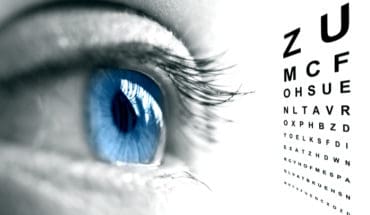Hybrid workers spend 12 hours per day on screens: This World Sight Day (12th October), Specsavers has released new research which suggests that UK hybrid workers spend an average of twelve hours a day, or sixty hours of a working week, glued to their screens. With 44% of Britain’s workforce now working remotely or in hybrid-office setups (i), today’s findings highlight the modern-day workforce’s lack of awareness about their entitlement to free eye tests.
Of the twelve hours spent on screen, close to five hours are spent in front of laptops, four and a half hours are dedicated to mobile phones and people spend three hours watching TV.
Highlighting the central role that screens play during a typical day, the survey of 2,000 hybrid workers, revealed they first reach for their phone at around 7.00am and do not put it down until nearly 10:30pm that evening.
Prioritised above and beyond typical morning behaviours, more than six in ten (63%) respondents agree that the first thing they do when they open their eyes in the morning is check their work emails – with 15% saying they rarely or never take a break from their screen.
Meanwhile, 83% of respondents admitted they start scrolling before they kiss their partner good morning, while nearly two-thirds (65%) look at their mobile before they’ve even stretched. Seven in 10 (70%) grab their phones before they’ve yawned and over half (53%) before they’ve gone to the loo.
Despite concerningly high screen time, over three-quarters (77%) of flexible workers have not yet accessed their free eyecare vouchers or tests. The survey indicates this might be because more than half (57%) were not aware that employees who use screens for their work should be offered a free eye test by their employer, which is a legal requirement. (ii)
Other benefits employers offer that workers have not accessed, include mental health days (87%), ergonomic equipment (90%) and money to help with high living costs (86%).
While 86% of those surveyed admit to being aware and concerned about the negative impact screens have on their eyesight, the average Brit confesses they haven’t had an eye test in the last four years, even though eye care professionals recommend them every two years.
Examining the nation’s eye health habits further, the survey revealed that over a quarter (29%) are having to enlarge the font size on their mobile phone so they can read it clearly, while just under half (49%) confess to zooming in on images so they can see them better. A further 28 per cent regularly squint at the screen in an effort to bring details into focus, all of which are tell-tale signs of presbyopia, which affects most people when they reach their 40s and may mean they need glasses.
Not only this, but a worrying eight in 10 Brits (88%) agreed that they are suffering from tired eyes or headaches potentially due to prolonged screen time.
Currently, there are no Government guidelines about screen use for adults in the UK. However, research shows that the majority of negative health impacts occur after six hours of screen usage (iii).
Commenting on the research, Giles Edmonds, clinical services director at Specsavers said:
“Our eyes are not designed to be fixed on a single object for a long period of time, especially when focussing on laptops with small screens, tablets or smart devices. It can make your eyes feel uncomfortable, sore, tired and even start to itch or burn. In rare cases, dry eyes syndrome can lead to more serious eye issues. But the good news is that there are simple solutions that can easily prevent eye strain and irritation and anyone who uses a screen for work, is entitled to a free eye test from their employer.
“The survey also shows that there are a lot of people squinting at screens or enlarging fonts in the UK who could be suffering from presbyopia. As we age, our eyes gradually lose the ability to focus on objects close-up so we recommend everyone gets their eyes tested every two years as they may need glasses.”
To find out more about your eye care entitlement visit: specsavers.co.uk/corporate/employees
Tips from Giles Edmonds, clinical services director at Specsavers on how to keep your eyes healthy when working
• Rest your eyes - Follow the 20:20:20 rule: look up from your screen every 20 minutes and look at something 20 feet away for at least 20 seconds. Looking into the distance helps relax the focusing muscles of your eyes, which in turn reduces eye fatigue.
• Adjust your workstation – Adjusting your screen settings to ensure that the brightness and contrast are balanced correctly can help, as well as making fonts larger. Also, be mindful of how your workstation is positioned. Adjust your screen so it is 15-20 degrees below eye level and around 50-70cm away from the eyes and make sure your room is properly lit to avoid squinting.
• Reduce glare – Reflections on your computer screen can cause glare and lead to eye strain. Try reducing this by attaching an anti-glare screen to your monitor or laptop to avoid external light shining onto the screen. Glasses wearers can also have lenses treated with an anti-glare coating, such as Specsavers UltraClear SuperClean, to help limit the impact of light reflections on your eyes to reduce eye strain. They are also smudge and scratch-resistant, which help to give an overall clearer view of your screen too.
Unless otherwise stated, all statistics are from a survey conducted by Perspectus Global Comms on behalf of Specsavers among 2,000 hybrid office workers. September-October 2023.
• i Characteristics of homeworkers, Great Britain: September 2022 to January 2023: https://www.ons.gov.uk/employmentandlabourmarket/peopleinwork/employmentandemployeetypes/articles/characteristicsofhomeworkersgreatbritain/september2022tojanuary2023#:~:text=Age%20and%20sex,reporting%20working%20from%20home%20only.
• ii https://www.hse.gov.uk/msd/dse/eye-tests.htm
• iii University of Leeds study about the use of screens in Britain post-lockdown: https://ahc.leeds.ac.uk/directory_record/1654/new_uses_of_screens_in_post-lockdown_britain
- Gut microbiome could delay onset of type 1 diabetes - 3rd April 2025
- The da Vinci 5 Robot Is Set To Transform Bariatric Care: - 31st March 2025
- Beyond money: the hidden drivers fuelling child food insecurity - 31st March 2025






